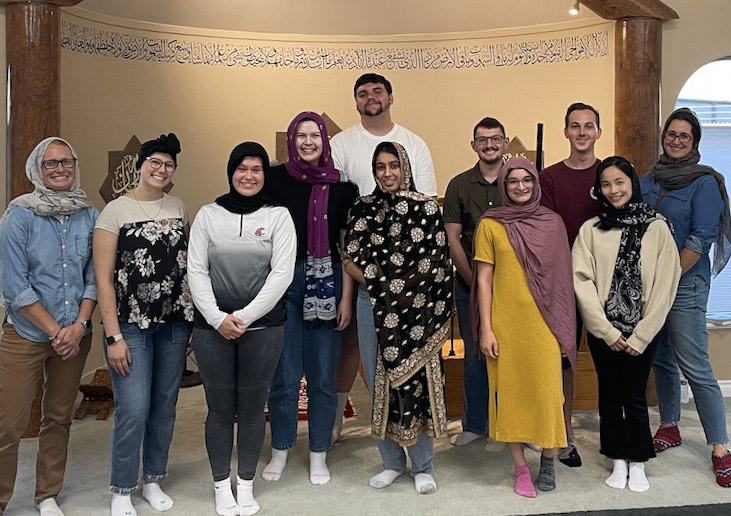Murrow and the next generation of religion reporters
Students the Spokane Islamic Center and Temple Beth Shalom, the Pullman Ashram and the Monastery of St. Gertrude.
Students visit the Spokane Islamic Center, Sept. 6.
April 24, 2023
Editor’s note: All of the panelists are part of the Daily Evergreen staff, however, the majority of students part of the Religion Reporting Project are not.
Four Edward R. Murrow College of Communication students talked about how reporting on different religions helped them overcome their preconceived notions about religion.
The panel took place 10 a.m. April 21 at Community Congregational United Church of Christ on 525 NE Campus St and was hosted by FāVS News, formerly named Spokane FāVS.
Anne Murphy, Alisa Volz, Mikayla Finnerty and Puneet Bsanti, who are all senior multimedia journalism students, presented their experiences with the year-long Religion Reporting Project.
Murrow College professor Tracy Simmons led the group of journalism students on the religion reporting project. The first religion reporting event happened around ten years ago and next year there are plans for the program to be funded by oTagsne confirmed donor.
The students in the Religion Reporting Project visited four locations: the Spokane Islamic Center and Temple Beth Shalom in Spokane, the Pullman Ashram on 441 Country Club Rd. and the Monastery of St. Gertrude in Cottonwood, Idaho, Simmons said in an email.
Volz said experiencing different religions was a totally different experience than just learning about them in history class.
“But it was just a completely different experience to be able to experience them firsthand. And that was really, really beneficial,” she said. “And I feel like for my future as a reporter, who knows what we all end up on. I don’t know if it’ll be religion, but I think that this experience will help me no matter what beat I work in.”
As a member of the LGBTQ community, Volz said she was worried that she would hear homophobic remarks when visiting churches or that it would be unsafe. Although she did not mention her LGBTQ affiliation to the churches directly, she felt safe attending the churches.
She said she learned that religions have faced prejudice and judgment just like the LGBTQ community has, so she was able to empathize with the religious community. The amount of security needed at the Jewish synagogue due to threats and acts of violence was “heartbreaking.”
Bsanti said the amount of prejudice that the Jewish community faces was surprising and awful. The rabbi was so kind and wanted the students to learn, but the amount of prejudice that the Jewish community faces should not be happening.
Before the project, she had a cynical view of religion, but knew that as a journalist she should be open-minded going into the project.
“I was nervous that maybe the people we talked to they’d be a little bit more hesitant to answer certain questions. But the majority of them were very open and they wanted us to learn,” Bsanti said.
The men and women at the mosque prayed in separate rooms, she said, but that is just part of their religion and it is not her place to be too judgemental to a religion that is not her own.
Murphy said that as a Palestinian, she was worried that she would not be accepted in the Jewish synagogue.
“I am very white passing so it’s kind of hard to tell,” she said. “It was more of a fear of them not being okay with me being there because of my ethnicity, I was very wrong on that. They were super welcoming, super accepting, even though I didn’t say that I was Palestinian.”
A lot of religion in the news is not reported from a perspective of people understanding the religion, but rather from a perspective of world politics, Murphy said, so it is important for people who do not have preconceived notions to talk about religion.
Finnerty said she is currently working on a piece about the Unitarian Universalist Church of the Palouse.
“This experience has allowed me to realize everyone thinks they are doing what they think is good. They could be doing some great things,” she said. “So you can’t really, you have to give them the benefit of doubt to speak for themselves. And as I’m reporting and doing this feature on this progressive church, I have to look at the other side of things … it just has really opened up my eyes.”
Bill Kerr, a member of UCC who attended the panel, said he struggles with his own faith and regards himself as a Christian agnostic. Sometimes his cynicism about religion takes over, which he does not like.
He said he learned a lot about how different faiths work and expanded his views beyond his own little world.
“To sort of begin a dialogue, that’s really encouraging,” he said.
Megan Guido, outreach coordinator for UCC, said the church partnered with Spokane FāVS to provide education around different types of faith and be as inclusive as possible. UCC is an LGBTQ-inclusive church and participates in Moscow Pride every year.
Guido said the panel was great and it was wonderful to hear student perspectives.
“I felt really good about the next generation of reporting,” Guido said. “Because they affirmed the fact that they’re willing to do the education to learn about different religions and viewpoints and go in with an open mind”









